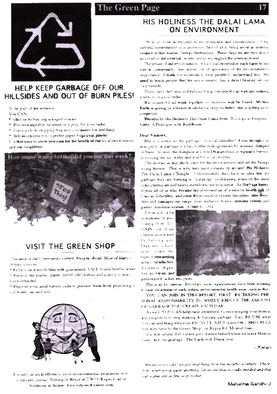Workshops
Our programs have provided critical environmental health information & training in Toxic Exposure Prevention, including practical solutions to harmful activities and alternatives to toxic materials. This empowers each individual to make wise choices for the health and future of their communities.
We have offered our workshops for Tibetan Health Educators, Tibetan Government Department leaders representing Health, Environment, Agriculture, Religion & Culture Departments; Tibetan Students at schools such as the Tibetan Transit School, Institute of Buddhist Dialectics, Tibetan Childrens' Village, Tibetan Institute of Performing Arts, for The Tibetan Welfare Office and for Monasteries such as Dolma Ling Nunnery, Ganden Choeling Nunnery, Ganden & Drepung Monasteries in South India, as well as for all the local Indian Grammar schools in the Upper Dharamshala area.
The words of one of our former environment students demonstrates the essence of our courses:
"Before I did not know which things are toxic and non-toxic,... also (about) conservation of resources. (My) actions will be to help the environment and to instruct other people how (the) environment is important and how to contribute for it."
--Wang Du, Former Environment Student, age 26, TCV Youth Education Center
Over the years we have provided Environmental Training, Staff and Service for the Environment & Development Desk (EDD) of the Tibetan Government in exile's Department of Information & International Relations (DIIR), upon request. Some of these programs have included:
Our programs have provided critical environmental health information & training in Toxic Exposure Prevention, including practical solutions to harmful activities and alternatives to toxic materials. This empowers each individual to make wise choices for the health and future of their communities.
We have offered our workshops for Tibetan Health Educators, Tibetan Government Department leaders representing Health, Environment, Agriculture, Religion & Culture Departments; Tibetan Students at schools such as the Tibetan Transit School, Institute of Buddhist Dialectics, Tibetan Childrens' Village, Tibetan Institute of Performing Arts, for The Tibetan Welfare Office and for Monasteries such as Dolma Ling Nunnery, Ganden Choeling Nunnery, Ganden & Drepung Monasteries in South India, as well as for all the local Indian Grammar schools in the Upper Dharamshala area.
The words of one of our former environment students demonstrates the essence of our courses:
"Before I did not know which things are toxic and non-toxic,... also (about) conservation of resources. (My) actions will be to help the environment and to instruct other people how (the) environment is important and how to contribute for it."
--Wang Du, Former Environment Student, age 26, TCV Youth Education Center
Over the years we have provided Environmental Training, Staff and Service for the Environment & Development Desk (EDD) of the Tibetan Government in exile's Department of Information & International Relations (DIIR), upon request. Some of these programs have included:
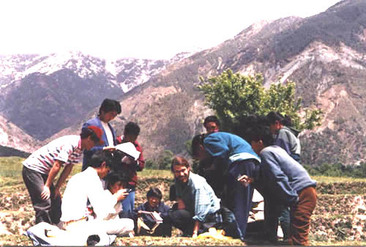
Environmental Education for newly arrived refugees at the Tibetan Transit School

Agriculture Department Trainees of the EDD's 1989-99 Environment & Agroforestry Training learn methods to transition from chemical to organic agriculture. These Trainees will become Community Leaders, educating Tibetans in their 17 respective settlements and promoting environmentally safe and appropriate agricultural practices.
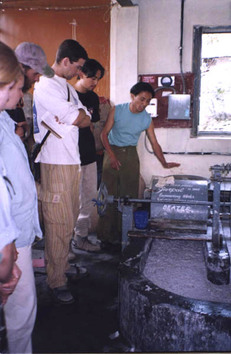
Environmental Job Placement:
Former Solutions in Action Environment student, Wangdu, was placed in a job where he now heads the Tibetan Welfare Office's Paper Recycling Project.
Former Solutions in Action Environment student, Wangdu, was placed in a job where he now heads the Tibetan Welfare Office's Paper Recycling Project.
"Preventative Environmental Health" Teacher Training"
Your teaching is a great seed for the future. You are both teaching 25 students who will become teachers about the important subject of environment and how to solve environment problems. This education will continue to grow, for our students will also teach others and so on through generations."
--Lobsang Tenje, Teacher, age 30, Institute of Buddhist Dialectics' Teacher Training Center
We understand that by training teachers, we can reach all of the local population more effectively. Since 1995, we have offered Teacher Training through conferences & workshops, upon request of local governmental and non-governmental organizations such as the Tibetan Department of Health, Environment & Development Desk (DIIR), Institute of Buddhist Dialectics' Teacher Training Center, the Tibetan Children's Village Teacher Training Center, WWF INDIA, and the Tibetan Institute of Performing Arts.
Teacher Training for Indians of the Dharamshala Area:
In 1997, we offered a Teacher Training organized by Dharamshala area NGO, "Dhualadar Public Education Society." This program offered classroom and hands-on Teacher Training for 8 local Health Care Educators, 2 local teachers & several others who will help to pass on this critical environmental health care information to 1,000's of students in over ten local Indian schools.
We also offered a training for local Indian school teachers in how to inculcate environmental education and ongoing follow-up activities into their required classes, building further on our work with WWF India's training courses in the past. For these courses, we developed a Teacher Training Curriculum and Resource Guide which will be used in this and other training courses for the Dharamshala area Indian community.
Environmental Education Curriculum Development & Dissemination
Solutions in Action's educators have developed various educational materials including a complete course guide, fact sheets, posters and hands-on displays to complement and support our programs & events. Our "Preventative Environmental Health Care" Teacher Training Guide, developed & translated in cooperation with the Department of Health (CTA), has been disseminated to health leaders & educators representing the Tibetan Department of Health, 54 community & monastic leaders in Mundgod, India, Teachers at the Tibetan Transit School, the 'Tibetan Environmental Awareness Movement' (TEAM) and humbly offered to both His Holiness the Dalai Lama & His Holiness the Karmapa for use in Tibetan settlements.
Our fact sheets have also been given to the Tibetan Welfare Office for use in their "Environment Center." All materials are continually developed and disseminated during educational programs. We have also developed a version of our Teacher Training Guide for use in the Indian Community.
Solutions in Action's educators have developed various educational materials including a complete course guide, fact sheets, posters and hands-on displays to complement and support our programs & events. Our "Preventative Environmental Health Care" Teacher Training Guide, developed & translated in cooperation with the Department of Health (CTA), has been disseminated to health leaders & educators representing the Tibetan Department of Health, 54 community & monastic leaders in Mundgod, India, Teachers at the Tibetan Transit School, the 'Tibetan Environmental Awareness Movement' (TEAM) and humbly offered to both His Holiness the Dalai Lama & His Holiness the Karmapa for use in Tibetan settlements.
Our fact sheets have also been given to the Tibetan Welfare Office for use in their "Environment Center." All materials are continually developed and disseminated during educational programs. We have also developed a version of our Teacher Training Guide for use in the Indian Community.
Monasteries
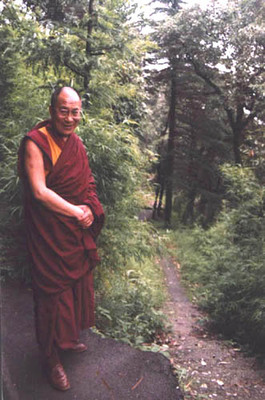
The Eco-Friendly Example for Tibetan Communities
The Dalai Lama is a global symbol of peace and environmental stewardship. It should follow that Tibetan communities should also be a reflection of his teachings. Yet living in India, where environmental problems abound, it becomes a difficult task to educate Tibetans to live up to this ideal.
In Tibetan Communities, Monks and Nuns are held in high esteem. They are meant to embody the ideal of human virtue and appropriate behavior. Thus, how the Monastic community works with their environment becomes a community wide example. Realizing this, we have concentrated effort on educating and supporting eco-friendly behavior amongst the Tibetan Monastic Community.
His Holiness the Dalai Lama on Environment:
"Now in order to succeed in the protection and conservation of the natural environment, it is important first of all to bring about an internal balance within human beings themselves. These days we are very much involved with the external world, while we neglect the internal world.... These days, not only individuals but governments as well, are seeking a new ecological order. But unless we work together no solution will be found. Mother Earth is giving us a lesson in universal responsibility, she is telling us to cooperate."
--From Ecological Responsibility: A Dialogue with Buddhism
Ganden Monastery's Community Health Educator, Sonam Tsephel leads SIA Director & Educator, Brian Heubel, on a tour of the Monastery's dumpsite. Together we are developing practical alternatives to local solid and toxic waste issues.
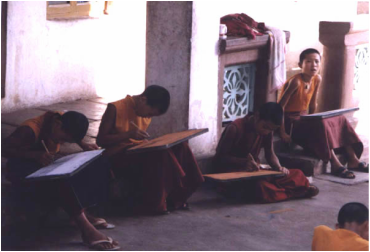
Environmental Solutions in Action
Here, some of the 70 young monks who live at Sakya Dratsang of Drepung Monastery in South India, learn Tibetan Calligraphy. During our environmental assessment of Drepung Monastery, we came to understand that the ink they always used was made of the black powder inside of batteries mixed with water! Based on the information provided during our Preventative Environmental Health Training Course about batteries, the Abbott of Sakya volunteered that they would stop this practice immediately in favor of using safer ink!
Here, some of the 70 young monks who live at Sakya Dratsang of Drepung Monastery in South India, learn Tibetan Calligraphy. During our environmental assessment of Drepung Monastery, we came to understand that the ink they always used was made of the black powder inside of batteries mixed with water! Based on the information provided during our Preventative Environmental Health Training Course about batteries, the Abbott of Sakya volunteered that they would stop this practice immediately in favor of using safer ink!
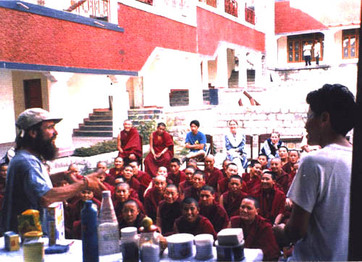
Other Eco-friendly examples in Monastries.
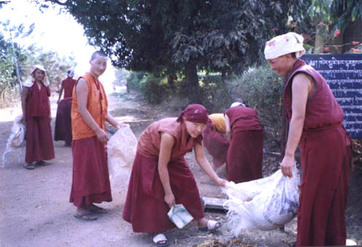
Tibetan Nuns from Dolma Ling Nunnery, Dharamshala, learn about the potential health hazards posed by chemical detergents, and how to distinguish them from safe, natural soaps.
Tibetan Nuns in the Doegyuling Settlement, Mundgod, South India provide a community-wide example of engaged Buddhism - WEEKLY GARBAGE CLEAN-UPS! Our recent training also emphasized how REDUCE the amount of garbage we each make.
Tibetan Nuns in the Doegyuling Settlement, Mundgod, South India provide a community-wide example of engaged Buddhism - WEEKLY GARBAGE CLEAN-UPS! Our recent training also emphasized how REDUCE the amount of garbage we each make.
Preventative Environmental Health Care
Teacher Training in Mundgod's Doeguyling Settlement, IndiaDoeguyling Environmental Education & Consultation Project:
Representative staff and teachers from Drepung Loseling, Drepung Sakya, Gaden Jangtse and Gaden Shartse Monasteries, joined 52 heads of local Tibetan villages, schools, & organizations, as well as health educators, to participate in a week-long Preventative Environmental Health Care Teacher Training Workshop, held Jan. 18-22, 2000.
Taught by Solutions in Action's experienced educators, the program was organized in cooperation with the Department of Health (Central Tibetan Administration), The Gere Foundation, the Settlement Representative and Health Coordinator. Participants learned practical means to fulfill the Dalai Lama's message to "Care for our Environment." Environmental Education and Action Plans were developed during the training, initiating various programs and legislation to reduce toxic exposure & other health risks in the Monasteries and settlement.
Following the training, over 6,000 monks were educated by those Monastery Staff trained during the workshop. Monastery leaders subsequently took actions such as banning the burning or random throwing of garbage in the Monastery and the use of the black material inside of batteries as ink for calligraphy and printing.
Immediately following the training, the Settlement Representative (Local Rep. of the Dalai Lama's Government in Exile) single-handedly educated 1,055 families on the dangers of plastic and batteries. Together, we drafted an agreement to ban burning of garbage at Kindergartens and other public areas during business hours, and a step-by-step plan aimed at collection of recyclable materials instead of dangerous burning. Village Leaders & Health Educators promised to hold community education meetings to reach the remaining 7,000 Mundgod residents.
An additional Environmental Health workshop for 30 local business owners was also held, upon the request of the Settlement Representative During the workshop, business owners agreed to each purchase and manage their own garbage bin in the dirty town center and to work towards cleaning this area.
Also upon request, we offered a preliminary assessment of local drinking water quality; consultation on local solid/toxic waste management & other potential environmental health concerns for the Monasteries and Settlement during our seven week visit!
We offer our sincere gratitude to all our supporters who helped to make this project happen! It was a great success as local leaders have since initiated their own educational, local clean-up and water protection programs to prevent toxic exposure on their community!! THANK YOU!
Teacher Training in Mundgod's Doeguyling Settlement, IndiaDoeguyling Environmental Education & Consultation Project:
Representative staff and teachers from Drepung Loseling, Drepung Sakya, Gaden Jangtse and Gaden Shartse Monasteries, joined 52 heads of local Tibetan villages, schools, & organizations, as well as health educators, to participate in a week-long Preventative Environmental Health Care Teacher Training Workshop, held Jan. 18-22, 2000.
Taught by Solutions in Action's experienced educators, the program was organized in cooperation with the Department of Health (Central Tibetan Administration), The Gere Foundation, the Settlement Representative and Health Coordinator. Participants learned practical means to fulfill the Dalai Lama's message to "Care for our Environment." Environmental Education and Action Plans were developed during the training, initiating various programs and legislation to reduce toxic exposure & other health risks in the Monasteries and settlement.
Following the training, over 6,000 monks were educated by those Monastery Staff trained during the workshop. Monastery leaders subsequently took actions such as banning the burning or random throwing of garbage in the Monastery and the use of the black material inside of batteries as ink for calligraphy and printing.
Immediately following the training, the Settlement Representative (Local Rep. of the Dalai Lama's Government in Exile) single-handedly educated 1,055 families on the dangers of plastic and batteries. Together, we drafted an agreement to ban burning of garbage at Kindergartens and other public areas during business hours, and a step-by-step plan aimed at collection of recyclable materials instead of dangerous burning. Village Leaders & Health Educators promised to hold community education meetings to reach the remaining 7,000 Mundgod residents.
An additional Environmental Health workshop for 30 local business owners was also held, upon the request of the Settlement Representative During the workshop, business owners agreed to each purchase and manage their own garbage bin in the dirty town center and to work towards cleaning this area.
Also upon request, we offered a preliminary assessment of local drinking water quality; consultation on local solid/toxic waste management & other potential environmental health concerns for the Monasteries and Settlement during our seven week visit!
We offer our sincere gratitude to all our supporters who helped to make this project happen! It was a great success as local leaders have since initiated their own educational, local clean-up and water protection programs to prevent toxic exposure on their community!! THANK YOU!
Tourist Education
Promoting Minimal Impact on Dharamshala's Environment
Each year, thousand's of international visitors come to Dharamshala to see His Holiness the Dalai Lama and the beautiful Himalayan Mountain ecology. Unfortunately, the local community is overwhelmed with the amount of refuse left behind to clutter overflowing garbage bins, open sewage drains and burnt on hillsides. This poses a serious health hazard for locals. The local Indian Municipality and Tibetan Welfare Office (TWO) have dedicated their time and funds towards dealing with collection and recycling of this waste.
To address this growing problem, we have encouraged tourists to REDUCE the amount of garbage they create and leave behind!! To do this, we have written articles for local publications including, CONTACT Community Newsletters' Monthly Green Page, as well as handouts for tourists, encouraging them to refill their water bottles or to bring their used batteries or recycle-ables to TWO's Green Shop.
We have made announcements and posted signs at the Dalai Lama's teachings to encourage eco-friendly behavior such as appropriate disposal of batteries. In the past, we have also cooperated with the TWO in organizing tourists to participate in community cleanups. These days, the TWO now coordinates these activities.
Promoting Minimal Impact on Dharamshala's Environment
Each year, thousand's of international visitors come to Dharamshala to see His Holiness the Dalai Lama and the beautiful Himalayan Mountain ecology. Unfortunately, the local community is overwhelmed with the amount of refuse left behind to clutter overflowing garbage bins, open sewage drains and burnt on hillsides. This poses a serious health hazard for locals. The local Indian Municipality and Tibetan Welfare Office (TWO) have dedicated their time and funds towards dealing with collection and recycling of this waste.
To address this growing problem, we have encouraged tourists to REDUCE the amount of garbage they create and leave behind!! To do this, we have written articles for local publications including, CONTACT Community Newsletters' Monthly Green Page, as well as handouts for tourists, encouraging them to refill their water bottles or to bring their used batteries or recycle-ables to TWO's Green Shop.
We have made announcements and posted signs at the Dalai Lama's teachings to encourage eco-friendly behavior such as appropriate disposal of batteries. In the past, we have also cooperated with the TWO in organizing tourists to participate in community cleanups. These days, the TWO now coordinates these activities.

